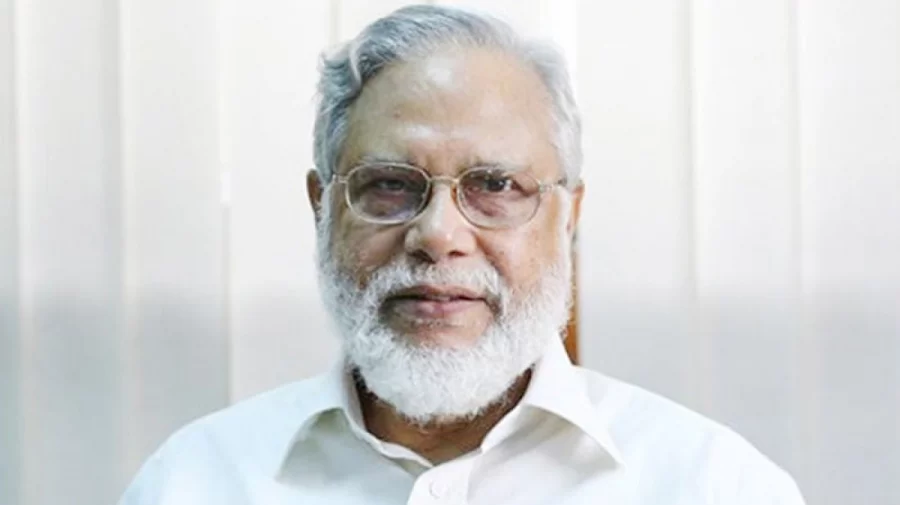ONLINE DESK
ABM Khairul Haque was picked up by the Detective Branch (DB) of Dhaka Metropolitan Police from his Dhanmondi residence on Thursday morning.
He was later produced before the Dhaka Chief Metropolitan Magistrate Court in connection with the murder of teenager Abdul Kaiyum Ahad, who was shot dead during the student protests in Jatrabari area during the July uprising in 2024.
The court ordered his imprisonment following a prosecution plea citing risks of evidence tampering. However, no defence lawyer appeared during the hearing.
Multiple cases have been filed against Khairul, including one in Narayanganj accusing him of forgery and altering the 2011 caretaker government verdict. Another case, filed by a BNP lawyer, where he has been accused for constitutional manipulation and sedition.
In 2011, Justice Khairul Haque delivered a verdict that abolished the caretaker government system — a move that, many now argue, set the stage for the political polarization, electoral disputes, and authoritarian drift that define Bangladesh’s present-day landscape.
Speaking to the Dhaka Tribune, constitutional law experts and senior jurists said the 2011 verdict not only destabilized the political order but also severely compromised the nonpartisan electoral framework that had ensured transfer of power.
It is impossible to disconnect the judgment from the current state of repression and disputed elections in the country, one senior lawyer remarked.
Justice Khairul Haque’s decision bears direct responsibility for the erosion of democratic credibility, he added.
But does his arrest stand on legally justifiable grounds?
Judicial immunity or breach of justice?
Legal analysts point out that judges are generally protected by judicial immunity for opinions expressed and rulings made in their official capacity. However, that immunity does not apply if the judge’s conduct can be proven to be motivated by bad faith, corruption, or undue political influence.
In principle, no judge should be prosecuted merely for a judgment, a Dhaka-based senior constitutional lawyer said.
But if the 2011 caretaker verdict was part of a broader political roadmap — if it can be demonstrated that the ruling was crafted in collusion with political actors or under partisan pressure — then it warrants serious investigation, he warned.
The experts emphasized that any arrest or prosecution must not appear retaliatory.
If this process is to uphold the rule of law, it must be rooted in transparency, fairness, and constitutional principles — not vengeance, one lawyer added.
They said an independent and impartial investigation to examine whether the verdict was legally and ethically motivated must be conducted. Then a clear separation between political revenge and accountability for unconstitutional conduct must be ensured. Thirdly, a clear communication to the public that this is not about personal vendetta but about the rule of law and democratic norms must be conveyed.
Therefore, the arrest of former chief justice ABM Khairul Haque may be justifiable under the rule of law, but only if it results from proper legal process and credible findings. At the same time, the government bears the moral and political responsibility to ensure this does not devolve into a symbolic act of political revenge, another lawyer told Dhaka Tribune, wishing anonymity.
Zainul Abedin, president of the Nationalist Lawyers Forum and vice chairman of the Bangladesh Bar Council, offered a scathing assessment of the former CJ’s conduct, calling the 2011 verdict legally unsound and politically destabilizing.
Speaking with Dhaka Tribune, Zainul recalled that as president of the Supreme Court Bar Association in 2012, he had publicly warned of the far-reaching dangers embedded in the verdict.
“I clearly said that this judgment was flawed for three core reasons. It would destabilize the country and seriously damage the democratic framework.”
He further noted a crucial contradiction in the judicial process.
“The short order delivered by Justice Khairul Haque at the time of the ruling and the full verdict released later were vastly different. There was a clear and deliberate departure from the initial order — an act that was beyond legal authority.”
According to Zainul, the former CJ also violated Appellate Division norms by finalizing the full verdict after his retirement.
“He was no longer under oath when the judgment was issued. A retired judge cannot legally pronounce or sign a verdict — that in itself was a constitutional breach,” he asserted.
It was not justice, it was judicial misconduct
Zainul was firm in dismissing concerns that the arrest might set a negative precedent.
“This is not about creating a culture of revenge. This is about direct and deliberate violation of legal procedures,” he said.
“If a former chief justice manipulates the judiciary to serve political interests, then he must be held accountable, he added.
“Back in 2012, I said he should face the people’s court. And that is exactly what is happening now,” he added.
Judicial immunity vs political motivation
The arrest has stirred debate on the principle of judicial immunity. Judges are typically shielded from prosecution over their rulings unless there is clear evidence of corruption, abuse of power, or political collusion.
In Zainul’s view, if credible proof emerges that Khairul Haque’s verdict was influenced by political actors or crafted to facilitate a partisan roadmap to power, then it is “absolutely justifiable” to investigate.
“This cannot be dismissed as a difference of legal opinion. This was part of a broader agenda that reshaped the country’s constitutional structure,” he said.
He emphasized that any investigation must be independent and impartial. “This must not be about vengeance. It must be about upholding the Constitution and the rule of law,” he added.
Who is Khairul Haque?
Born in Madaripur in 1944, ABM Khairul Haque studied law at Dhaka University and completed his Bar-at-Law at Lincoln’s Inn in London. He was elevated to the High Court in 1998, appointed a regular judge in 2000, and promoted to the Appellate Division in 2009. In September 2010, he became the 19th chief justice of Bangladesh. After retirement, he served as chairman of the Bangladesh Judicial Service Commission.
Among his notable rulings, he upheld the verdict in the Bangabandhu murder case, declared the 5th Amendment illegal, and issued judgments protecting the Buriganga and other rivers.
Now, his 2011 verdict and its aftermath have once again brought him to the centre of national discourse—this time not as a jurist, but as an accused.Mamun Tribune


